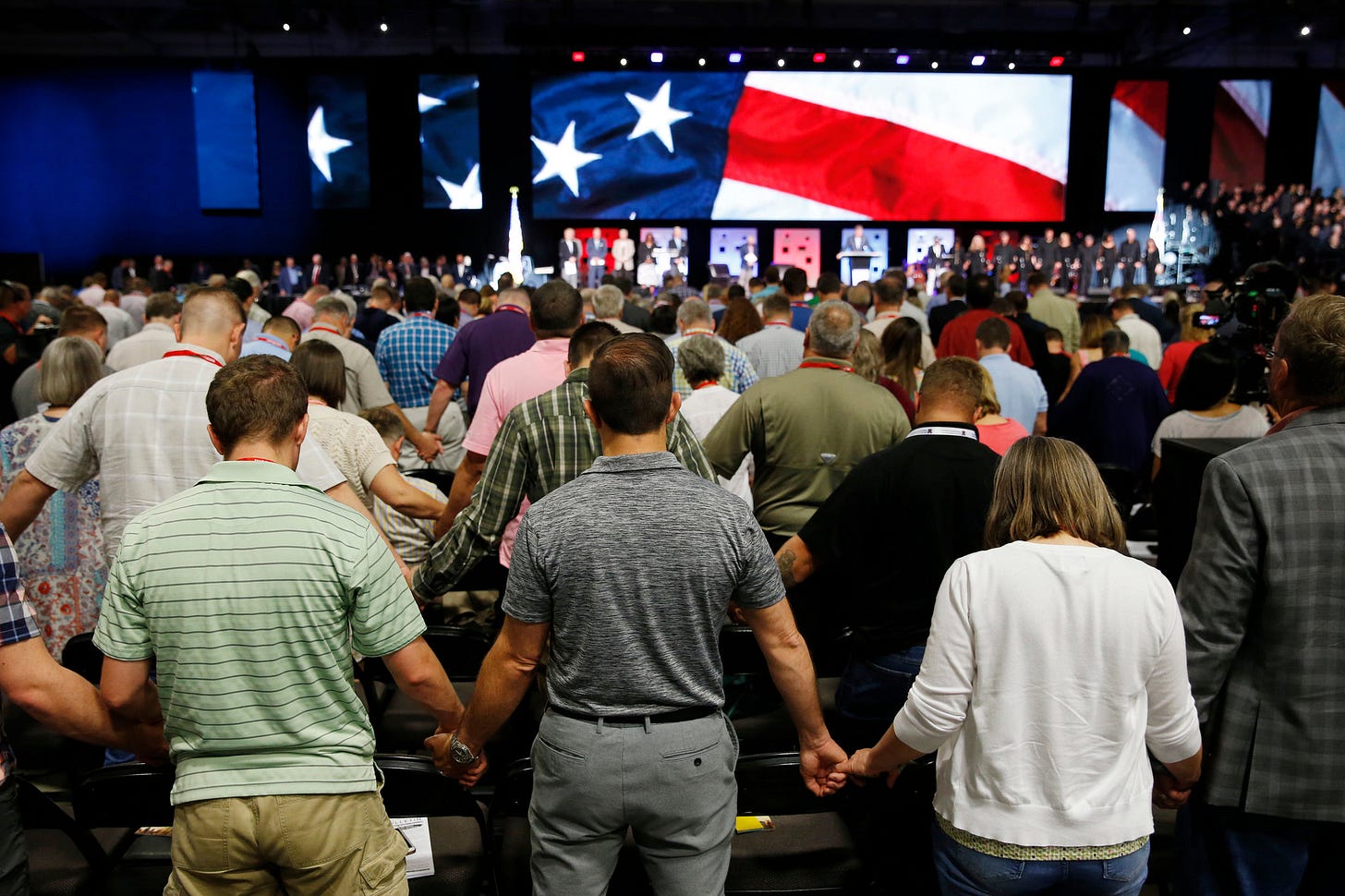One of the biggest prizes in the game of politics is the Evangelical vote. It was a big factor in the 2016 Presidential race that helped get Trump into the White House. Biden and the Democrats are, somewhat reluctantly, clawing out some support therein.
What exactly do Evangelicals want from government? There is a prevalent, unwritten notion among His people that a major purpose of government is to be God’s agent here on Earth: to punish sin, to promote His will, and to guide us all into Heaven.
To be blunt: that is pure gobbledygook. There is absolutely nothing in the Constitution, the Declaration of Independence, or the Bible to back up this silly concept. The U.S. is not a theocracy. The vain attempts to accomplish this mythical goal leads to all manner of horrible governance. Let us examine the rationale behind it all and bust this myth.
It starts with God’s commandments of “Thou shalt not steal” and “Thou shalt not kill. It just so happens that these sins are also banned by government. But outlawing theft and murder has nothing to do with theology; rather, it’s all about protecting basic human rights, a concept that is not really addressed in the Bible. The conclusion that every Biblical sin must have a parallel law produces a lot of terrible legislation, such as attempting to regulate sex. These laws waste valuable law enforcement resources that should be be spent protecting life and property, and only foster disrespect for the police. And Jesus never implored us or government or anybody to judge someone else’s sin and enact punishment. “Judge not, that you shall be judged,” He said (Matthew 7:1).
This false rationale also does not consider other Biblical commands such as the one that says we are to put our faith and trust in only Jesus. No one suggests codifying that commandment into law - and in fact, the First Amendment specifically prohibits it.
The Bible also commands us to help the poor and the needy. Matthew 25:40 quotes Jesus: “Whatever you did for the least of my brothers, you did for me.” Acts 2:45 says: “They gave to everyone who had need.” But this command is directed at his people, his followers, NOT the government. There is nothing noble or compassionate about politicians spending OPM (Other People’s Money). The misinterpretation of this command has empowered all manner of socialist and communist tyranny. My colleague Peter Venetoklis has written that governmental wealth redistribution programs provide a handy excuse to ignore this command, thinking: “I don’t need to obey God and help the needy - government is doing it for me!”
And then there is Romans 13:1, which says: “Obey the ruling authorities, because God has established all authority.” Again, this verse is directed at God’s people, meant to influence Christian attitudes - not to empower ruling authorities. Remember that, throughout history, both secular and sacred, there have been all manner of tyrannical, despotic, evil, murderous governments in the world. The Bible does not sanction this, and certainly does not imply that government is some sort of deity.
Now let us address the highly controversial topic of abortion. For many Evangelicals, abortion is the only issue. Is it murder? Um, yeah; in fact, even the staunchest “pro-choicer” would agree. But what is the role of government?
For a long time, I have contemplated this question, and searched the Bible for applicable words of wisdom. My conclusion: the passion and intensity around the abortion issue is totally out of proportion to its effect on us all. In 2019, there were about 630,000 abortions in the U.S., which computes to about one percent of us. Face it: there are lots of other issues out there (crime, taxes, inflation, bureaucracy, poverty, pollution, global warming, medical care, education, road congestion, foreign threats, police misconduct, substance abuse, immigration, etc., etc.) that greatly affect much larger chunks of the population. So to all those one-issue abortion activists, here’s the answer: get a life. There are bigger, more important problems that need attention.
But I digress. Again, the Bible is not a Guide for Voters. It is an excellent guide for how we should run our life - but there is nothing therein with which to base governmental policy. Government and kings and rulers and such are human creations, not divine. In 1 Samuel 8:10-20, God even warned the people about the evils and dangers of government. But, the people ignored Him, and the rest is history.
But political issues aside, what about the personal aspects and qualities of the individuals themselves who occupy the halls of government and run our nation? Should not Bible-believing Evangelicals seek to elect men and women of exemplary quality, God-fearing devout Christians who serve as role models to all?
Well let’s address that orange elephant in the living room: What in blazes were Evangelicals thinking when they enthusiastically supported a heathen the likes of Donald Trump? He is an arrogant, bombastic, deceitful, belligerent, racist, adulterous, immature, thrice-married, disgusting piece of human trash, who wouldn’t recognize the inside of a Bible even if he held it aloft in his hand (he did that, in front of St. John’s Church in D.C.), The very fact that Evangelicals so much as gave him the time of day ruins any credibility they might have had saying they were promoting God’s Will on Earth.
But even if Evangelicals selected someone from the opposite personality spectrum - a true Christian who actually ran his/her life as Jesus commands - what would happen? See the paragraph above where I slew out a smattering of pressing issues that are really important. Simply being a good Christian does not mean this person has the wisdom or political scruples needed to solve societal problems, or to tame this insatiable, power-crazed, out-of-control beast we call the government.
Politicians often claim that their unique relationship with God Almighty gives them wisdom and morality beyond that of us ordinary mortals. It happens here in America, too. Twenty years ago, then-President George W. Bush said: “God told me to end the tyranny in Iraq.” Thus began one of America’s most ill-conceived military follies in history. There simply is no relationship between a politician’s religious faith and how well he/she does the job. Furthermore, Matthew 6:5 clearly states that prayer is supposed to be a private affair; Bush was way out of line here.
So where does all this leave Evangelicals, and the politicians who crave their support? Clearly, all believers must stop confusing government with God. They are totally separate entities with separate goals. The answer to the question of how, and for whom, one should vote is not found in the Bible. Other than defending their right to worship without government interference, religious groups need to stay out of politics.
The best way forward, regardless of your religion (or the lack thereof), is to be an informed citizen. Follow the news from multiple sources (i.e. do not depend solely on, say, Fox News, or social media). Also read multiple opinions and editorials - including, of course, excellent articles from this blog! But also check out non-libertarian material. Compare the pros and cons from various points-of-view, and surely you will conclude that libertarianism makes the most logical sense. Now chose the best candidate.










David, while I appreciate the point you are trying to make, and I agree with several of your assertions, I disagree strongly with some of what you have written here, the primary of which is your premise: “There is a prevalent, unwritten notion among His people that a major purpose of government is to be God’s agent here on Earth: to punish sin, to promote His will, and to guide us all into Heaven.” I know of no Evangelicals (save the fringe, unscriptural NAR adherents) who believe any such thing. While many do preach submission to government based on Romans 13 (which you cite *in part*), Evangelicals do not seek a Theocracy nor do they expect government to lead us to heaven.
Side note: Romans 13 *does* actually promote the idea that government is God’s agent to punish evil and “praise” good - “Every person is to be in subjection to the governing authorities. For there is no authority except from God, and those which exist are established by God...Do what is good and you will have praise from the same; for it is a minister of God to you for good. But if you do what is evil, be afraid; for it does not bear the sword for nothing; for it is a minister of God, an avenger who brings wrath on the one who practices evil. Therefore it is necessary to be in subjection, not only because of wrath, but also for conscience’ sake. For because of this you also pay taxes, for rulers are servants of God, devoting themselves to this very thing” (Rom. 1-6, abridged).
That said, I have never heard *anyone* insist or even insinuate that “every Biblical sin must have a parallel law.”
As for judging, please don’t be one of those people who so mangles Mt. 7:1. In context, Jesus is telling the crowd to not judge *hypocritically*. Look at that verse with the rest of what follows: ““Do not judge so that you will not be judged. For in the way you judge, you will be judged; and by your standard of measure, it will be measured to you. Why do you look at the speck that is in your brother’s eye, but do not notice the log that is in your own eye? Or how can you say to your brother, ‘Let me take the speck out of your eye,’ and behold, the log is in your own eye? You hypocrite, first take the log out of your own eye, and then you will see clearly to take the speck out of your brother’s eye” (Mt. 7:1-5). This is also confirmed by Jesus in John 7, where He tells the crowds, “Do not judge according to appearance, but judge with righteous judgment” (Jn. 7:24). We are to judge, but to judge rightly and righteously avoiding hypocrisy.
Regarding faith and trust in only Jesus, you are spot on there brother!
Help the poor:
Again, I don’t know of any Evangelicals (at least, actual believers) who believe government should be the one providing for the poor, nor do I know anyone who uses such as an excuse to not do so themselves. I rant quite frequently about how individuals, religious organizations, and charities are responsible for these things - *not* government. Government has *no* business performing charitable works.
Abortion:
In this, I agree, too many Christians are one-issue voters. The problem is, too many people in general are *uninformed* voters. Media does nothing to help this, nor do most political campaigns which tend to be little more than “vote for me or you’ll be stuck with that other evil moron.” Since you do, however, as I do, believe government is there to protect our rights, which includes our right to life, and government is there to punish murder (which you admit abortion is), then it should be government’s business. Seeing how pro-abortionists are usually also pro-gun control, because “guns kill children” (cognitive dissonance much? - actually, there are multiple times more abortions each year than child deaths related to guns), it ranks up there for me. It is a matter of, again, the purpose of government - protecting our rights. We have a right to life. We have a right to keep and bear arms. These are explicitly delineated in our founding documents. Those who are pro-infanticide typically are actually pro-big government, because they prefer government *trample* certain rights while manufacturing others out of whole cloth. So, while we shouldn’t be one-issue voters, I believe abortion is more important than you propose.
And you’re right - God warned the Israelites what would happen if they had a king, and it came to pass.
Trump:
Let me state that I did not, in 2016, vote for Trump (I wrote in Darrell Castle, candidate for the Constitution Party). You are right - he is bombastic and boorish, but he promised something his opponent and a long line of his predecessors had not - to put America first. Did he succeed? In some things, and in others not. Many, however, voted for him simply because he wasn’t the murderous, disgusting, lying communist hag against whom he was running. You’re right - being a good Christian does not make one good for government. Again, there are too many who are completely ignorant of what our founding documents actually say. With regard to “societal problems,” many you named in the list of “pressing issues that are really important” are not the business of government, especially not the federal government.
Government is not God:
“Other than defending their right to worship without government interference, religious groups need to stay out of politics.” Again, with this, I disagree, as I believe would the founding fathers. No, they didn’t want the church running the country, but they wholly expected the people, and those elected, to be religious. I have written about this on more than one occasion - here are just two examples: https://curetsky.substack.com/p/misunderstanding-jefferson , https://curetsky.substack.com/p/can-religion-truly-be-kept-out-of . The founding fathers were influenced by their faith, and they expected those who followed would be as well. Regardless, yYour title for this section is wholly accurate. It is not God, it is not intended to be God, and it should not be viewed as God. I do not know Evangelicals, however, who make government their God. I know a great number on the left do, but I don’t equate the left with Evangelicals, and those who claim to be Evangelical *and* leftist, I question their Christianity. Not saying either that Christian = Right nor that Right = Christian - in many ways, Christians should lean more libertarian (as you assert). The problem, and I think what led you astray with this article, is when government starts to protect, and even give preferential treatment to, that which is evil (or “sin”). When government protects the alleged right to kill a baby instead of protecting it, government is failing its duty. When government elevates homosexuality as a protected class, it is, in a sense, endorsing a religion, encouraging sin, and violating others’ first amendment right to exercise their religion freely.
I apologize for the length of this response. I love The Roots of Liberty and most of what you guys write, but I think (aside from your conclusion that we should lean libertarian - I would say “conservative libertarian” - or, perhaps simply “constitutional originalist/conservative”) you ran down the wrong track on this one. My $0.02 - take it for what it’s worth. Thank you David.